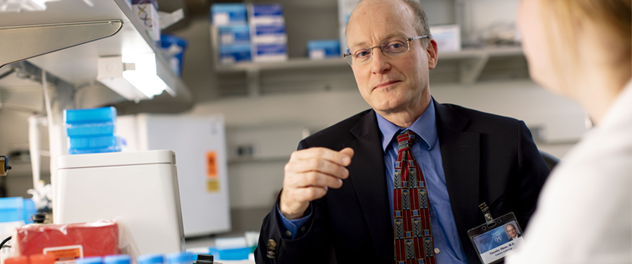-

Expert advice to provide the best SCAD care
Mayo Clinic offers medical professionals extensive, evidence-based resources to guide diagnosis and management of SCAD and to find clinical trials. The Mayo Clinic SCAD Research Program is actively recruiting participants and welcomes physician referrals.
For Medical Professionals
Mayo Clinic offers extensive resources for you and your patients. Information on clinical practice and trials is available from Mayo Clinic's SCAD Clinic. Mayo's team of SCAD experts has evaluated hundreds of patients with SCAD since 2010.
Mayo Clinic's SCAD Research Program is actively recruiting study participants and will enroll your patients if they are interested and eligible. After angiographic review and case ascertainment, your patients can complete their initial enrollments without coming to Mayo Clinic, although we will see them in consultation if you or they wish.
The program team will contact participants as it produces findings that warrant additional diagnostic testing or provide prognostic information.
SCAD research studies at Mayo Clinic
Please see the projects page for more detailed information on research being conducted in the SCAD Research Program.
Findings
Since its inception in 2010, the SCAD Research Program has gained new insights into associated conditions and treatment approaches. Highlights and significance of findings from the Mayo Clinic SCAD Research Program include:
- Extracoronary vascular abnormalities. A high rate of abnormalities in noncoronary blood vessels has been identified in patients with SCAD. These include fibromuscular dysplasia (FMD), aneurysms and additional dissections. Patients with these findings may need additional imaging and follow-up and may be at higher risk of recurrent SCAD.
-
Specialized imaging techniques. Mayo researchers are defining the role and value of specialized imaging of the inside of the coronary artery at the time of SCAD to make an accurate diagnosis and guide treatment. The SCAD diagnosis can be missed if only standard coronary angiography is used.
The SCAD Research Program has demonstrated that advanced imaging techniques such as intravascular ultrasound and optical coherence tomography can not only enhance diagnostic accuracy, but also guide treatment in the crucial early minutes of a heart attack.
- Complications with stenting. The program team has reported significantly lower success rates and higher complication rates when coronary artery stenting or ballooning is utilized to open artery blockages due to SCAD, compared with rates for patients with typical heart attacks. This has implications for early decision-making for treatment and highlights the need for an accurate diagnosis.
- Selective intervention. Mayo researchers have observed a significant rate of spontaneous healing of SCAD-affected arteries that occurs without specific intervention (medical treatment only). This has led to a change in Mayo's clinical practice, whereby in select patients with SCAD, clinicians do not intervene with stenting or bypass surgery, but instead allow them time to heal on their own.
- Routine statin use not recommended. Unlike atherosclerotic disease, there is no evidence that statins prevent recurrent myocardial infarction or dissection. Since there is no evidence of benefit, statins should not be routinely given to patients with SCAD, but reserved for those with hyperlipidemia.
- Prevalence. SCAD incidence is not as rare as previously believed and may be the major cause of heart attack in women under age 40 and in pregnant or postpartum women.
- Male participants needed. There is an inherent selection bias in the program's sample due to the origin of the research from a women's online community. Further, the research team has observed sex differences in the cause and outcomes of SCAD. Therefore, a focus on recruiting more men to the program registries is critically important to better understand the significance of these findings and the true prevalence of SCAD in men and women in order to provide optimal care.
- More information is available. Mayo Clinic SCAD researchers participated in the development of the 2018 scientific statement from the American Heart Association on SCAD, which provides a comprehensive overview of the condition. View the AHA statement on PubMed.